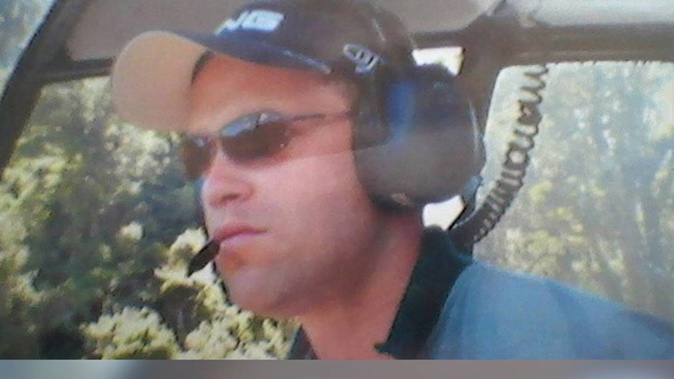
/cloudfront-ap-southeast-2.images.arcpublishing.com/nzme/GVTUITHPWVKFU7LYQQGVZ4322M.jpg)
A driver who walked to safety after his ute crashed down a steep slope, died the next day - not from his injuries but from having drunk out of his vehicle's water coolant bottle.
Marlborough man Pryor Alan Lee suffered metabolic acidosis following ingestion of ethylene glycol (an anti-freeze used in car radiators), coroner Meenal Duggal said in a recently-released report.
Lee had described being insatiably thirsty after his crash on March 6, 2019, and likely drank from the coolant bottle in his vehicle before managing to walk to a rural house the following day.
His family told Open Justice they still miss their adventurous son, brother, and nephew who they say packed more into his 36 years than most people do in a lifetime.
Pryor's mother Wendy Matthews said her son spent 11 years training for various tickets and was a competent helicopter pilot and boat skipper. He had recently also completed dive training.
His interests led him to outdoor work throughout New Zealand, including driving commercial jet boats in Taupo and operating a charter fishing business in Auckland.
At the time of the crash, he was employed as a skipper with King Salmon in the Marlborough Sounds.
Having just had his scheduled days off at home in Greymouth he was on a long drive back to work in Bulwer in the Outer Pelorus Sounds when his 2011 Ford Ranger 4WD utility left the road some time during the afternoon.
It rolled 200m down a slope under Te Towaka-Port Ligar Road - an unsealed road that follows extreme terrain to connect the outer Marlborough Sounds from Rai Valley.
/cloudfront-ap-southeast-2.images.arcpublishing.com/nzme/NBX7AMXYTJATF6CGHOFKBXAO2E.jpg)
- Police seek help to identify Christchurch cyclist in serious crash
- Seven injured, two critically, after crash involving St John vehicle
Pryor Alan Lee died the day after he crashed. Photo / Supplied
The homeowners at the French Pass house Lee went to told the coroner he arrived there using a stick as a crutch and looking dishevelled.
He was "clearly bashed up" with cuts and his feet only partly covered with socks. The homeowners said Lee had bruising to his face and body and was breathing heavily.
Lee told them he had spent the night outdoors after a crash caused by him having to take evasive action to avoid a vehicle overtaking another one. He thought the drivers were freedom campers.
He refused the homeowners' offer to call emergency services to airlift him to hospital but accepted their offer to drive him to Nelson Hospital instead.
They said Lee was talkative and coherent during the drive but was worried about his dog, which he couldn't find after the accident.
He complained of pain in his chest and was breathing heavily at times. The couple again offered to call the air ambulance but Lee was adamant it was not necessary. As he was still lucid and had good colour, they did not insist.
His condition deteriorated
After arriving at Nelson Hospital just after midday the homeowners helped Lee to complete the admission forms, spoke with nursing staff, and then left once his clinical assessment began.
About 3.40pm Lee's condition deteriorated rapidly. He was admitted to the Intensive Care Unit, intubated and ventilated. He was suffering from severe acidosis (a buildup of acid in his blood) as well as hyperkalemia (a high level of potassium in his blood).
Despite full resuscitation attempts, he could not be revived.
Medical evidence was that he suffered from depression, anxiety, and difficulty with sleep for which he took medication. He also had a significant underlying coronary artery disease.
Ethylene glycol was detected in his toxicology results raising concerns about whether Lee – who described being insatiably thirsty after the crash - might have drunk from the coolant bottle in his vehicle.
Police found the bottle had been tipped over and the top of it was removed, making it possible Lee took water from it.
The risks
Senior Constable Simon Burbery said Lee's vehicle did not contribute to the crash. He might have been suffering from the side effects of his routine medication or from fatigue - during the drive he messaged his partner that he was going to stop for a nap.
Police made numerous inquiries of locals but no one had seen any vehicles in the area like those Lee told the homeowners had caused him to swerve.
The unmarked and unsealed road was a challenging drive but negotiable for a driver maintaining proper control, Burbery said.
He noted the particular dangers for drivers travelling to the Outer Marlborough Sounds is that the edge of the road on their left falls away and "holds grave consequences" if a driver drifts too far to the left when negotiating left-hand curves.
He suggested Marlborough District Council consider installing reflective roadside marker posts. He believed posts would better delineate the road and create a psychological barrier that would keep drivers from straying too close to the edge.
The council responded by saying the road near the crash site carried fewer than 20 vehicles a day so was not required to have reflective posts.
Notwithstanding, the council had installed the posts where hazards had been identified. But it was difficult to maintain them due to harsh conditions and intense winds in the outer Sounds. Standard reflective posts only last a month outdoors. The council was currently trialling more robust ones.
After the trial, it intended to install posts on the inside and outside corners on the Croiselles-French Pass Road and the Te Towaka-Port Ligar Road along with multi-hazard signs.
Reflections on a talented and much-loved son
Matthews said she had never driven the road where her son crashed and couldn't bear to do so since. Pryor and other people had told her what a treacherous, twisting road it was, especially in high winds.
A country person herself, she too had been on a fair few "narrow goat tracks" so could visualise what it was like.
She believed Pryor might have dozed off ahead of the crash - police told her vehicle marks suggested it.
Pryor was knocked out and had lain outside of the vehicle for 14 hours in the heat before finally coming to.
She could well imagine the confusion and thirst that would have caused him to take a "swig" of the radiator water on what was a "stinking hot" night.
Before leaving the crash scene he had called out to his dog - a silver bichon frise named Violet who he affectionately called "Filthy" - but she did not come. He feared she had been thrown from the vehicle and had not survived.
Police crash investigators later found Filthy waiting with the vehicle.
Matthews said officers told her they could not believe Pryor survived the crash given the distance his ute had plummeted.
"They reckoned it was just his bush skills that got him to the house," Matthews said.
Born in Wairoa, Pryor and his family moved when he was a young boy to Haast, where he did most of his schooling and developed a love of hunting and fishing. Later he went to Mt Aspiring College, where he continued to build on his repertoire of outdoor pursuits and took up snowboarding.
- Sarah Curtis, Open Justice
Take your Radio, Podcasts and Music with you









